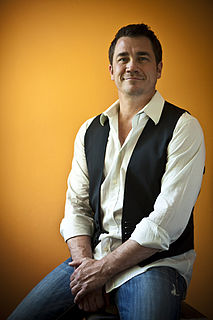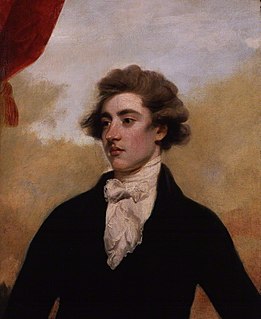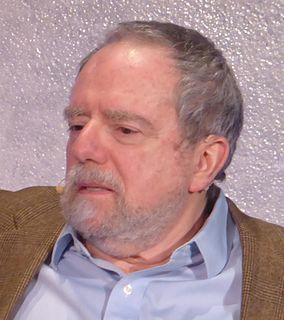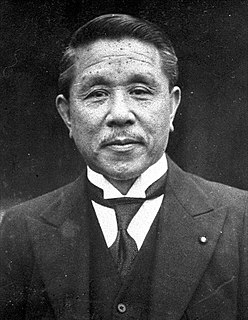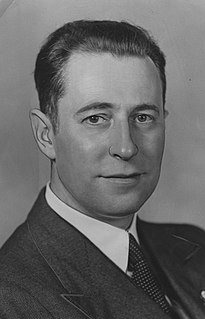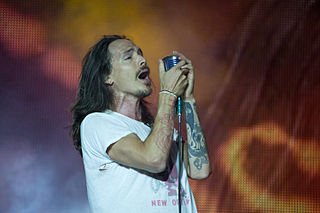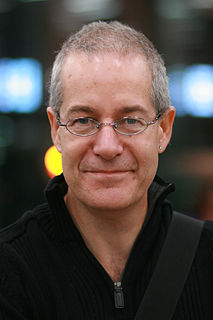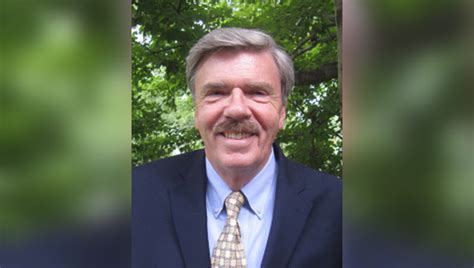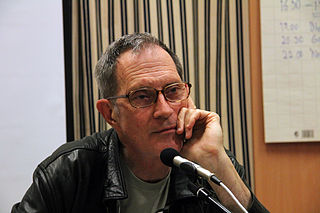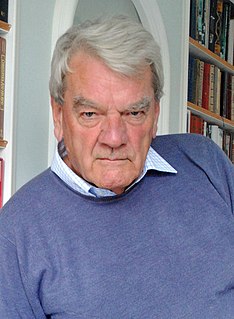Top 216 Atrocities Quotes & Sayings - Page 4
Explore popular Atrocities quotes.
Last updated on April 16, 2025.
From our best qualities come our worst. From our urge to pull together comes our tendency to tear each other apart. From our devotion to a higher good comes our propensity to the foulest atrocities. From our commitment to ideals comes our excuse to hate. Since the beginning of history, we have been blinded by evil's ability to don a selfless disguise. We have failed to see that our finest qualities often lead us to the actions we most abhor, murder, torture, genocide and war.
Human beings can be redeemed. Empires cannot. Our refusal to face the truth about empire, our refusal to defy the multitudinous crimes and atrocities of empire, has brought about the nightmare Malcolm predicted. And as the Digital Age and our post-literate society implant a terrifying historical amnesia, these crimes are erased as swiftly as they are committed.
What concerned me was that [James Mattis] played not only a critical role as a battlefield commander in Fallujah, but also, afterwards, when he was promoted to various other higher-ranking positions, he served as a convening authority in court-martial proceedings against various marines who had been accused of atrocities - for example, in the Haditha massacre, where a group of marines went on a killing spree after one in their unit was killed.
It's easy to forget history or give it a cliff notes. The cliff notes of history. But mainly, so much of what happens in 'Eyes on the Prize' happened in Jackson, Mississippi. Jackson, Mississippi isn't really known for any other touchstone to the movement, other than Medgar Evers being killed. There were sit-ins and riots and atrocities.
Kaplan can't understand trivialities. The triviality here is that nobody except the ultra right-wing jingoists like Kaplan are comparing atrocities by various countries. What honest people are saying seems to be incomprehensible: that we should keep to the elementary moral level of the gospels. We should pay attention to our own crimes and stop committing them. This would be true even if we were killing one person, OK? And it's even more true when we're killing millions of people.
I began to think of war, even so-called "good wars" like World War II, as corrupting everybody. Violence begetting violence. The good guys beginning to act like the bad guys. And when I studied the history of wars, it seemed to me that that was the case. Athens vs. Sparta in the Peloponnesian War. The Athenians presumably the democratic state. The Spartans the totalitarian state. But as the war went on, the Athenians began to act like the Spartans. They began committing atrocities and cruelties. So I saw this as a characteristic of war, even so-called "good wars."
The reign of terror to which France submitted has been more justly termed "the reign of cowardice." One knows not which most to execrate,--the nation that could submit to suffer such atrocities, or that low and bloodthirsty demagogue that could inflict them. France, in succumbing to such a wretch as Robespierre, exhibited, not her patience, but her pusillanimity.
When one watches some tired hack on the platform mechanically repeating the familiar phrases - bestial atrocities, iron heel, blood-stained tyranny, free peoples of the world, stand shoulder to shoulder - one often has a curious feeling that one is not watching a live human being but some kind of dummy, the appropriate noises are coming out of his larynx, but his brain is not involved
Man is the only animal that deals in that atrocity of atrocities War. He is the only one that gathers his brethren about him and goes forth in cold blood and calm pulse to exterminate his kind. He is the only animal that for sordid wages will march out... and help to slaughter strangers of his own species who have done him no harm and with whom he has no quarrel.... And in the intervals between campaigns he washes the blood off his hands and works for the universal brotherhood of man with his mouth.
I can't say that you should extract this or that value from my books explicitly. They are up for interpretation. In terms of the obligation, I think we're all individuals on this planet, trying to scratch our way through the day, and if you're writing a book exposing atrocities in Rwanda or writing a murder mystery set in a mountain village, I think both ways of spending you time are valid and both books are probably fine to read.
When I saw photographs of children murdered by the Fascist, I felt furious pity. When the supporters of Franco talked of Red atrocities, I merely felt indignant that people should tell such lies. In the first case I saw corpses, in the second only words. . . I gradually acquired a certain horror of the way in which my own mind worked. It was clear to me that unless I cared about every murdered child impartially, I did not really care about children being murdered at all.
[Vathek] has, in parts, been called, but to some judgments, never is, dull: it is certainly in parts, grotesque, extravagant and even nasty. But Beckford could plead sufficient "local colour" for it, and a contrast, again almost Shakespearean, between the flickering farce atrocities of the beginning and the sombre magnificence of the end. Beckford's claims, in fact, rest on the half-score or even half-dozen pages towards the end: but these pages are hard to parallel in the later literature of prose fiction.
I would've written this story [Django] if [Barack] Obama were president or if he never existed. For one, I think it's time to tell a story that deals with this subject America has avoided for so long. Most countries have been forced to deal with the atrocities of their past that still affect them to this day. But America has been pretty slippery in the way that it has avoided looking slavery in the eye. I believe that's a problem.
The Nazis, for him, are merely available movie tropes--articulate monsters with a talent for sadism. By making the Americans cruel, too, he escapes the customary division of good and evil along national lines, but he escapes any sense of moral accountability as well. In a Tarantino war, everyone commits atrocities. Like all the director's work after 'Jackie Brown,' the movie is pure sensation. It's disconnected from feeling, and an eerie blankness--it's too shallow to be called nihilism--undermines even the best scenes.
For the lesson of such stories [of resistance to Nazi atrocities] is simple and within everybody's grasp. Politically speaking, it is that under conditions of terror, most people will comply but some people will not, just as the lesson of the countries to which the Final Solution was proposed is that "it could happen" in most places but it did not happen everywhere. Humanly speaking, no more is required, and no more can reasonably be asked, for this planet to remain a place fit for human habitation.
The awful atrocities of religion happened when people assume that God shares your likes and dislikes. The Crusaders when into battle to kill Muslims and Jews and cried, "God will's it." That was their battle cry. Obviously God willed no such thing. The Crusaders were simply projecting onto a deity they'd created on their own image and likeness, all their hatred and loathing of these faiths and made it endorse some of their most awful prejudices and lethal prejudices.
And who can deny that Stalin and Mao, not to mention Pol Pot and a host of others, all committed atrocities in the name of a Communist ideology that was explicitly atheistic? Who can dispute that they did their bloody deeds by claiming to be establishing a "new man" and a religion-free utopia? These were mass murders performed with atheism as a central part of their ideological inspiration, they were not mass murders done by people who simply happened to be atheist.
I investigated reported Japanese atrocities committed by the Japanese Army in Nanking and elsewhere. Verbal accounts of reliable eyewitnesses and letters from individuals whose credibility is beyond question afford convincing proof that the Japanese Army behaved and is continuing to behave in a fashion reminiscent of Attila and his Huns. Not less than 300,000 Chinese civilians were slaughtered, many in cold blood.
I did not know much history when I became a bombardier in the U.S. Air Force in World War II. Only after the War did I see that we, like the Nazis, had committed atrocities... Hiroshima, Nagasaki, Dresden, my own bombing missions. And when I studied history after the War, I learned from reading on my own, not from my university classes, about the history of U.S. expansion and imperialism.
It's obsequious little nicety-nice girls like me who allow assholes to run the world: Miss Harlot O'Harlots, billionaire phony tree huggers, hypocrite drug-snorting, weed-puffing peace activists who fund the mass-murdering drug cartels and perpetuate crushing poverty in dirt-poor banana republics. It's my petty fear of personal rejection that allows so many true evils to exist. My cowardice enables atrocities.
Faced with the potential of mass atrocities and a call for help from the Libyan people, the United States and our friends and allies stopped Gadhafi's forces in their tracks. A coalition that included the United States, NATO and Arab nations persevered to protect Libyan civilians. So this is a momentous day in the history of Libya. The dark shadow of tyranny has been lifted, and with this enormous promise the Libyan people now have a great responsibility: to build an inclusive and tolerant and democratic Libya that stands as the ultimate rebuke to Gadhafi's dictatorship.
Moreover, there is this completely false trial. I would participate wholeheartedly in a trial if it were to determine the guilt for 5 million murdered people and the guilt for the atrocities. But I see in this trial endless other things brought out and I have the feeling that in the shadow of the guilt of these murders the German people shall be considered guilty of everything, and in the shadow of this guilt the Americans, English, French, and especially the Russians will want to get rid of their own dirty linen.
No regrets. Never never any regrets. Everything has been an experience and has led to me now. Everything has been important and essential. Fear... I'm afraid of what people, including myself, are capable of, but it also excites me. I'm afraid of the atrocities that we are capable of and the things that can happen if everyone makes decisions based on fear.
Each year, members of Canada’s Ukrainian community, Parliamentarians and others commemorate the Holodomor at gatherings across the country. In doing so, we honour the memory of those who perished and the legacy of those who survived, including many who found refuge in Canada. It is by remembering the tragedies and atrocities of the past that we can equip ourselves to prevent them from happening again. That is why this national tour, which will reach Canadians of all ages and backgrounds, is an important initiative
Prior to and during [John] Locke's time, it was difficult to determine where religion or church left off and government or state began. The powers of both were often combined. As a result, churches frequently used the force of the state to promote and enforce their interests and doctrines. This caused horrendous atrocities against Jews and heretics, as well as the European religious wars between Catholics and Protestants of the sixteenth and seventeenth centuries that resulted in the deaths of millions of people.
Actions are held to be good or bad, not on their own merits, but according to who does them. There is almost no kind of outrage-torture, imprisonment without trial, assassination, the bombing of civilians-which does not change its moral color when it is committed by 'our' side. The nationalist not only does not disapprove of atrocities committed by his own side, he has a remarkable capacity for not even hearing about them.
The most dramatic case is that of the Central Americans. Why are people fleeing Central America? It's because of the atrocities the U.S. committed there. Take Boston, where there's a fairly large Mayan population. These people are fleeing from the highlands of Guatemala, where there was virtual genocide in the early 1980s backed by Ronald Reagan. The region was devastated, and people are still fleeing to this day, yet they're sent back.
Atrocity is recognized as such by victim and predator alike, by all who learn about it at whatever remove. Atrocity has no excuses, no mitigating argument. Atrocity never balances or rectifies the past. Atrocity merely arms the future for more atrocity. It is self-perpetuating upon itself - a barbarous form of incest. Whoever commits atrocity also commits those future atrocities thus bred.
I'm a controversial artist, one who dares to have an opinion and bothers to create music and videos that challenge people's ideas in a world that is watered-down and hollow. In my work I examine the America we live in, and I've always tried to show people that the devil we blame our atrocities on is really just each one of us. So don't expect the end of the world to come one day out of the blue – it's been happening every day for a long time.
We still live in a world of such gross injustice and inequality, that only privileged people like ourselves can afford to think of eros and art as top concerns in life. They are important, for sure, but I think it's high time to shift priorities around, away from selfish indulgence, and toward more concern for the wellbeing of so many others who suffer atrocities, injustice, and famine, all over the planet.
In trying to make a broader historical point about the range of atrocities the Germans committed against many people, I made a clumsy association about the Holocaust, for which I am sorry and I regret. Jews obviously do not control media or any other industry. The fact that the Holocaust is still a very important, vivid and current matter today is, in fact, a great credit to the very hard work of a broad coalition of people committed to the remembrance of this atrocity - and it was an atrocity.
... the United States, for generations, has sustained two parallel but opposed states of mind about military atrocities and human rights: one of U.S. benevolence, generally held by the public, and the other of ends-justify-the-means brutality sponsored by counterinsurgency specialists. Normally the specialists carry out their actions in remote locations with little notice in the national press. That allows the public to sustain its faith in a just America, while hard-nosed security and economic interests are still protected in secret.
Literature for me… tries to heal the harm done by stories. (How much harm? Most of the atrocities of history have been created by stories, e.g., the Jews killed Jesus.) I follow Sartre that the freedom the author claims for herself must be shared with the reader. So that would mean that literature is stories that put themselves at the disposal of readers who want to heal themselves. Their healing power lies in their honesty, the freshness of their vision, the new and unexpected things they show, the increase in power and responsibility they give the reader.
The men began to trade tales of atrocities, first stories they had heard, then those they'd witnessed, and finally the things that had happened to themselves. A litany of personal humiliation, outrage, and anger turned sicklelike back to themselves as humor. They laughed then, uproariously, about the speed with which they had run, the pose they had assumed, the ruse they had invented to escape or decrease some threat to their manliness, their humanness. All but Empire State, who stood, broom in hand and drop-lipped, with the expression of a very intelligent ten-year-old.
It [the Holocaust] is something like a religion.... The Intellectual Adventure is that we are reversing this entire trend within the space of one generation - that in a few years time no one will believe this particular legend anymore. They will say, as I do, that atrocities were committed. Yes, hundreds of thousands of people were killed, but there were no factories of death. All that is a blood libel against the German people.
I did not set out to be beloved and just, only strong." 'A King can be better than that," the Prince insisted. "And so we all begin, determined to better our fathers' performances, knowing we can change the very nature of humanity, make it better, cleaner. But then daggers strike in the night, and peasants revolt, and all manner of atrocities become a necessity as breakfast. Only Princes believe in the greater good. Kings know there is only Reign, and all things may be committed in its holy name.



